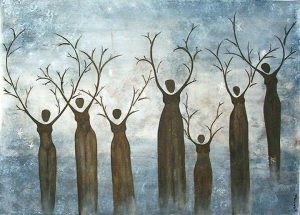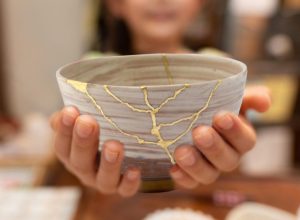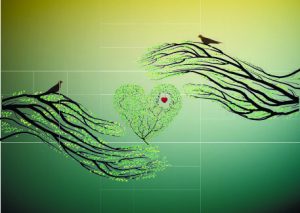 The Yogabliss, Two Rivers/RiverTree Yoga on-line Moving into Meditation classes met this morning. We explored time and space, movement and stillness. We became aware of how we related to sensory, emotional and mental experience. We created an inner environment in which we could watch experience change. Embodied awareness, conscious breathing and slow movement helped us to open our minds and hearts.
The Yogabliss, Two Rivers/RiverTree Yoga on-line Moving into Meditation classes met this morning. We explored time and space, movement and stillness. We became aware of how we related to sensory, emotional and mental experience. We created an inner environment in which we could watch experience change. Embodied awareness, conscious breathing and slow movement helped us to open our minds and hearts.
Our practice was inspired by Rhonda Magee,a law professor, meditation instructor and racial justice advocate. She is author of The Inner Work of Racial Justice. Stopping and knowing we are stopping; Taking a conscious breath; Observing and staying Present (STOP) are tools Rhonda uses to facilitate trauma-sensitive, restorative mindfulness.
 We heard John Fox’s poem, When Someone Deeply Listens to You, from his collection: Finding What You Didn’t Lose. John is founder and Practitioner of Poetic Medicine. “The Institute for Poetic Medicine offers tools and support to heal body, mind and spirit through the creative and therapeutic process of hearing, speaking and writing poetry.”
We heard John Fox’s poem, When Someone Deeply Listens to You, from his collection: Finding What You Didn’t Lose. John is founder and Practitioner of Poetic Medicine. “The Institute for Poetic Medicine offers tools and support to heal body, mind and spirit through the creative and therapeutic process of hearing, speaking and writing poetry.”
We drew from the book, The Five Invitations, written by hospice carer, teacher and author Frank Ostaseski. Frank believes that being with our fears is a transformational experience that can be a “doorway to compassion.”
Finally we heard poet Pat Schneider’s poem, Instructions for the Journey, from her collection, Olive Street Transfer. Pat was a beloved and passionate teacher of writing. Discover more about her in A Profile of Pat Schneider.
Create a comfortable seat or lie down as you need to. Sitting upright or lying down – sense your strong back; your sit bones and legs meeting Earth. Broaden your collar bones and relax your shoulders. Release any tightness in your arms and hands. Relax your jaw and let your senses open. Feel yourself pausing. Know that you are stopping. Tune into what is true for you right now. Stop. Breathe. Abide with what is true. . . . Notice how and where it expresses in your body . . . Experience embodied awareness . . . Notice how you are relating to what is true . . .
Know that you are stopping. Meet what is true. Breathe. Feel. These are the inner resources that can help us transform our reactivity to responsiveness. . . . They help us suspend judgment so discernment can rise. You might bring any difficulty or any joy into your heart. . . . .
Relax and breathe easy. Explore the nature of the experience . . . Stay long enough to witness its essential nature is to change. . . . Include any thoughts, emotions, or sensations – any tension, unsteadiness, butterflies or even numbness. Notice where you feel these as sensations in your body. No right or wrong about what you are feeling . . . Now broaden your awareness to take in the difficult circumstances you’ve been dealing with. . . . Notice how you can be in this situation without being ruled by it. . . . Feel your steady breathing and let there be space around it.
 Sense your inner resources by offering compassion and loving kindiness to your self. What does it feel like to give yourself more space, more time? What does it feel like to offer yourself compassion? Can you take it in? As you calm down, open to the choices you have . . . How to best respond for all concerned? . . . Can you open to possibilities? How to best move forward from here? . . . Perhaps you need more time . . dialog . . . inquiry . . . the counsel and support of a trusted friend . . .
Sense your inner resources by offering compassion and loving kindiness to your self. What does it feel like to give yourself more space, more time? What does it feel like to offer yourself compassion? Can you take it in? As you calm down, open to the choices you have . . . How to best respond for all concerned? . . . Can you open to possibilities? How to best move forward from here? . . . Perhaps you need more time . . dialog . . . inquiry . . . the counsel and support of a trusted friend . . .
Now feel your presence . . . Know that you are deeply listening to yourself. What is like to be seen and heard? What qualities of being are present? Can you bring these same qualities to others? Here is John Fox’s poem:
When Someone Deeply Listens to You
When someone deeply listens to you
it is like holding out a dented cup
you’ve had since childhood
and watching it fill up with
cold, fresh water.
 When it balances on top of the brim,
When it balances on top of the brim,
you are understood.
When it overflows and touches your skin,
you are loved.
When someone deeply listens to you
the room where you stay
starts a new life
and the place where you wrote
your first poem
begins to glow in your mind’s eye.
It is as if gold has been discovered.
When someone deeply listens to you
your bare feet are on the earth
and a beloved land that seemed distant
is now at home within you.
When we open to what is true . . . we listen deeply. When someone listens to you. . . your cup is filled . . . you are understood . . . you are loved. Feel your steady breathing and let there be space around it. If you like you can place a hand over your heart as a way of feeling comfort. In this presence, connect with that strong, wise part of yourself . . . that part of your being that aspires that all beings be free of suffering. . .
In his book, The Five Invitations, hospice carer, teacher and author Frank Ostaseski writes:
. . . When fear speaks, courage is the heart’s answer. . . . Life does not always present itself in ways that are right or reasonable. . . . we are rarely in control of . . . twists and turns of fate, and most especially not of our deaths. . . .
The Buddhist tradition describes. . . “great and courageous bodhisattvas” . . . beings who . . . have the fortitude to stand with suffering . . . able to maintain a courageous presence while they are afraid. They open to fear and are willing to hold it, learn from it and be transformed by it. . . . fear serves as a catalyst, a doorway to compassion and a pathway to transformation for all beings who are afraid. . .
 Our fears are human. We can reflect on how our fears might be narrowing our vision or restricting our lives to what is comfortable and familiar. Do we react to defend the our identities before considering something someone is trying to tell us? These are also very human tendencies. Can we relax our vigilance and take those risks that will allow us to reach out to others with understanding?
Our fears are human. We can reflect on how our fears might be narrowing our vision or restricting our lives to what is comfortable and familiar. Do we react to defend the our identities before considering something someone is trying to tell us? These are also very human tendencies. Can we relax our vigilance and take those risks that will allow us to reach out to others with understanding?
This is the practice of courageous presence. Stay with the experience, breathing calmly, steadily; the mind’s operations are revealed. We can gradually relax as beliefs, assumptions, memories and stories begin to surface. Kind hearted and curious, we question them. We recognize and defuse our reactive impulses.
We explore the nature of the experience . . . We stay long enough to witness its essential nature is to change. We have compassion for our human reaction: when we see something we love we want to hold on to it. When it falls or fades away we feel loss and there can be an opening. There is an expansion to include this loss and how it will change. Here is poet Pat Schneider’s Instructions for the Journey:
The self you leave behind
is only a skin you have outgrown.
Don’t grieve for it.
Look to the wet, raw, unfinished
self, the one you are becoming.
 The world, too, sheds its skin:
The world, too, sheds its skin:
politicians, cataclysms, ordinary days.
It’s easy to lose this tenderly
unfolding moment. Look for it
as if it were the first green blade
after a long winter. Listen for it
as if it were the first clear tone
in a place where dawn is heralded by bells.
And if all that fails,
wash your own dishes.
Rinse them.
Stand in your kitchen at your sink.
Let cold water run between your fingers.
Feel it.

